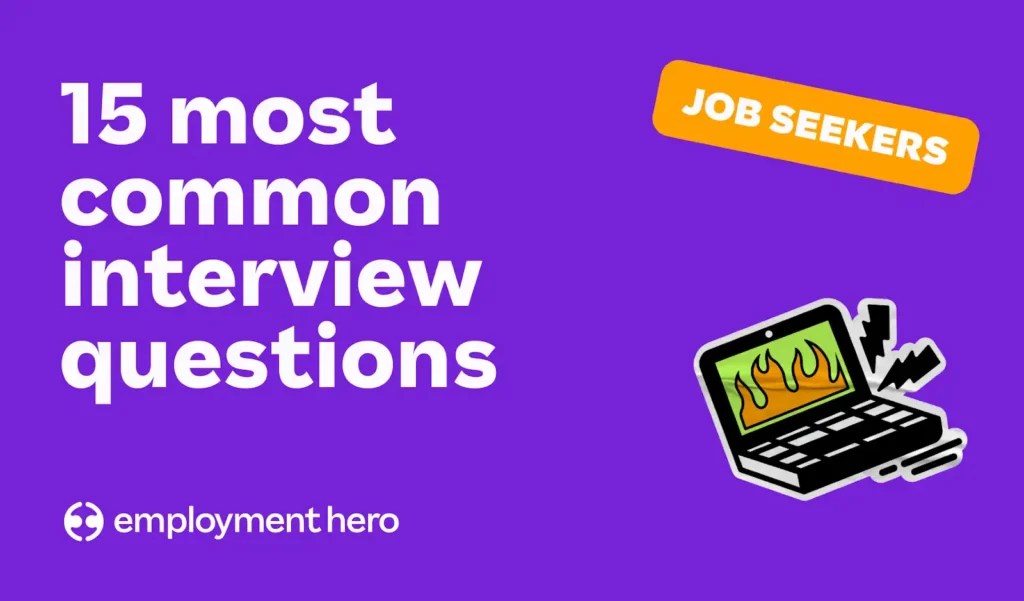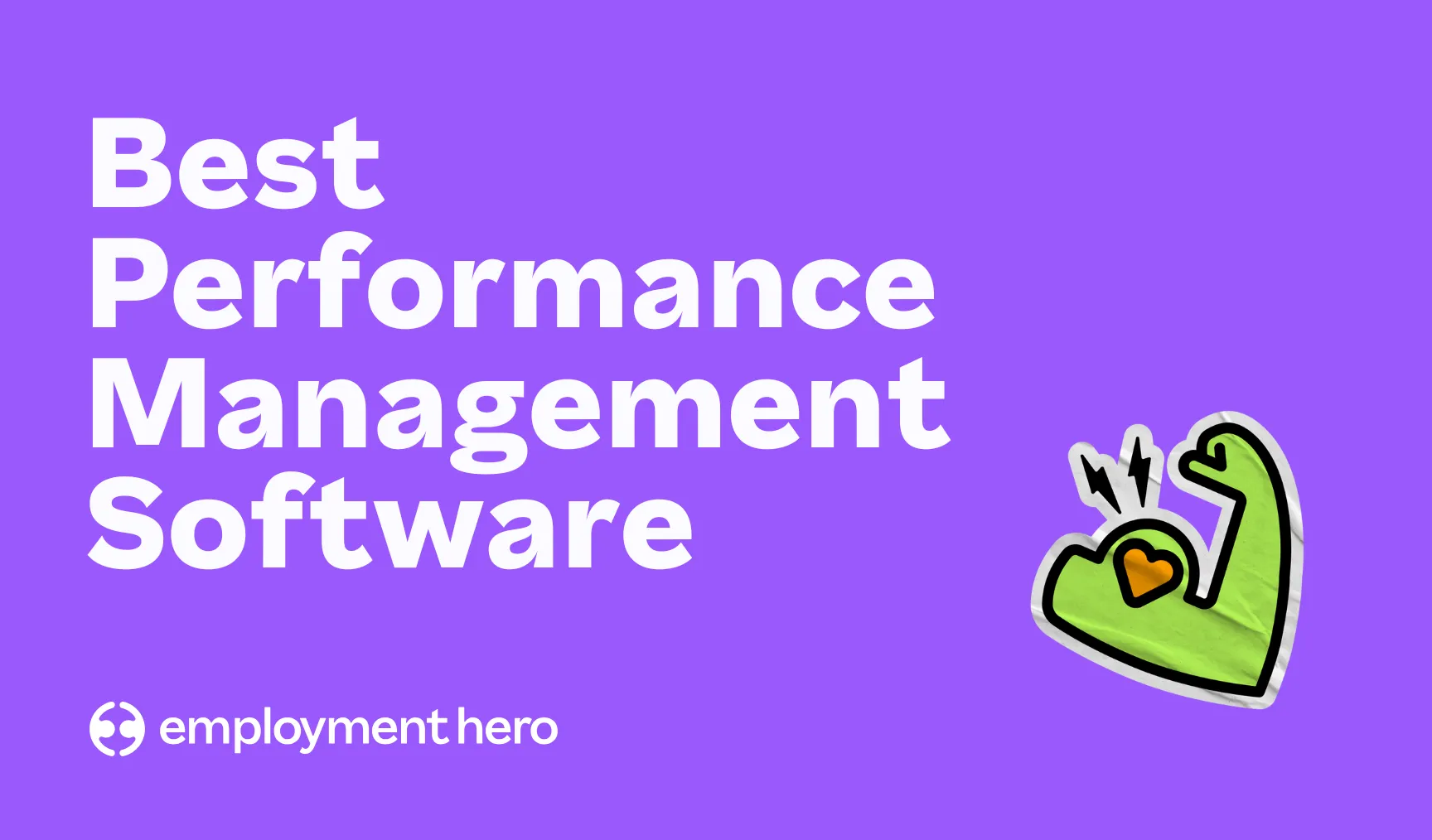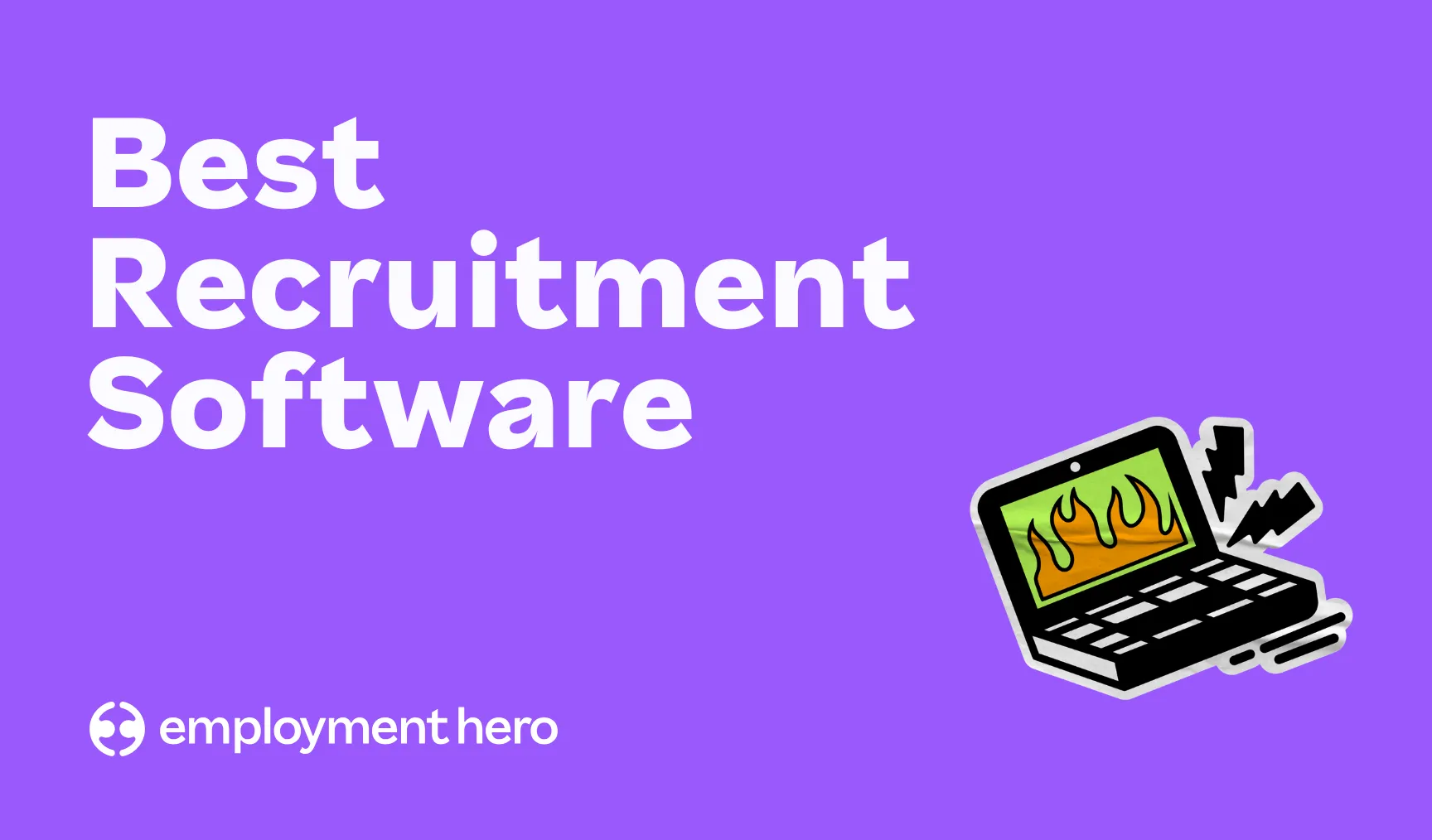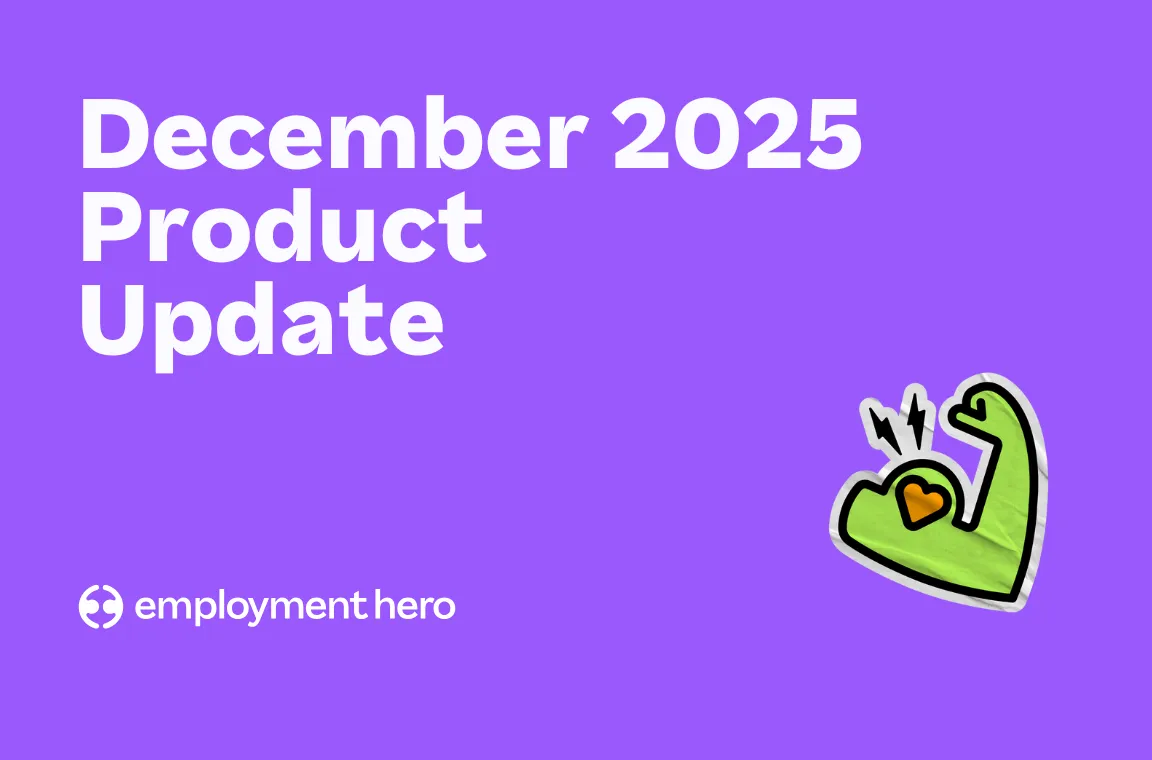15 Common job interview questions with answers

Contents
Job interviews can be nerve-wracking, but the key to standing out is preparation. Knowing what to expect and how to respond makes all the difference in reducing interview stress. Job seekers across Australia, whether fresh graduates or experienced professionals, can benefit from job interview preparation.
Ready to nail your next interview? We’ve got you covered with 15 of the most common job interview questions and example answers to get you started. We’ll also share the reasons why interviewers ask these questions so you can keep these in mind as you craft your responses.
Why preparing for common interview questions matters
Knowing what kind of questions to expect, and having your answers ready, can make all the difference when it comes to interview confidence. Here’s why:
- Reduce anxiety: Preparation gives you confidence. By familiarising yourself with potential questions, you’ll have ready-made answers that prevent stumbling under pressure.
- Make a strong impression: Clear, thoughtful responses demonstrate professionalism and communication skills.
- Showcase relevance: Well-prepared answers allow you to connect your experiences with the job’s requirements.
- Improve performance: With practice, you’ll refine your delivery, keeping answers concise and impactful.
Preparation builds confidence, and confidence leads to results. For job seekers in Australia, these tailored tips will ensure you’re interview-ready.
Top 15 common job interview questions and sample answers
1. Tell me about yourself
This classic opener often leaves people unsure of where to begin. Keep it structured and relevant:
- Summarise your background.
- Highlight professional achievements tied to the role.
- End with short-term objectives.
Example answer:
“My name’s Emma, and I have five years of experience in marketing, specializing in social media strategy and content creation. I’ve worked with Australian startups to create campaigns that increased engagement by 30%, and I’m eager to bring this expertise to your team. My goal this year is to introduce innovative strategies that align with your company’s focus on creativity and user engagement.”
2. What do you know about our business?
This is where research shines! Navigate their website, news mentions or LinkedIn.
Example answer:
“I’ve done my research and learned that your company is one of Australia’s most innovative financial tech firms, recently featured in the AFR for its seamless integration services. Your commitment to customer-first strategies aligns perfectly with my values, and I’d love to contribute to such forward-thinking initiatives.”
3. What interests you about this position?
Tie your passion with their needs. Talk about the role and the business.
Example answer:
“The role resonates with me because it combines my data analytical skills with customer-driven insights. I admire your focus on community-driven sustainability projects, and I’m eager to contribute my green innovation experience towards making an impact here.”
4. How is your previous experience relevant?
Be specific. Mention how past roles align with key skills from the job description.
Example answer:
“As a retail manager, I developed customer training strategies that increased our Melbourne branch’s sales by 20%. Your emphasis on customer retention reminds me of that achievement, and I’m excited to apply similar strategies here.”
5. Why did you leave your previous role?
Focus on professional growth. There’s no need to trash-talk your past job if it didn’t go well. People move on or want to find a better fit for themselves all the time. Focus on what you want next.
Example answer:
“I enjoyed my time at XYZ Company, but after four years, I wanted a fresh challenge to further my leadership skills. This opportunity offers more responsibilities within a company that aligns with my progressive outlook.”
6. What are your strengths?
Use strengths tied to their job requirements. Yes, you might be a brilliant crocheter or touch-footy champ, but if that doesn’t apply to the role then maybe leave that out.
Example answer:
“My greatest strength is my adaptability. Leading remote projects taught me how to pivot strategies quickly, ensuring productivity no matter the circumstances.”
7. What are your weaknesses?
Turn a potential weakness into a strength by showing growth. It’s about showing that you’re aware of your growth areas, and actively working on them.
Example answer:
“In the past, I found it hard delegating tasks, preferring to handle everything myself. However, I’ve focused on improving this by mentoring team members and trusting their capabilities, which has resulted in smoother workflows.”
8. What’s your preferred work or management style?
Match your style to the job’s work culture. Finding the right work culture is essential to your success in the role and your wellbeing. A big salary might be tempting, but if the role doesn’t suit your work style, it can be hard to thrive. The best job is one that suits how you like to work so you can focus on getting the good work done.
Example answer:
“I thrive in collaborative environments where diverse perspectives are valued but also appreciate clear guidance for objectives. This balance ensures team synergy without ambiguity.”
9. What are your salary expectations?
Research is vital. Provide ranges politely and flexibly. If you want more in-depth tips, head over to our blog post on navigating salary expectation questions.
Example answer:
“Based on my research and the responsibilities outlined, I believe a range of $80,000–$90,000 aligns with industry standards. I’m open to discussing this as part of the full benefits package.”
10. Can you give examples of leadership?
Even non-managerial roles can demonstrate leadership moments. Think about times that you’ve volunteered, taken initiative, led a project or stepped in while the manager was away.
Example answer:
“I proposed a mentoring initiative at my last job to support junior staff, fostering growth while increasing team retention. Leading by example is core to who I am.”
11. How do you handle stress?
Showcase productive strategies, unfortunately crying in the bathroom may not be the best one to share. Think about how you might breakdown tasks, meditate when you get home or prioritise requests.
Example answer:
“When faced with tight deadlines, I prioritise tasks while remaining communicative with the team. Breaks for clear thinking also help me minimise burnout.”
12. How would you handle workplace conflict?
Stay solution-driven and avoid turning the interview into a therapy session.
Example answer:
“I believe conflict often arises from miscommunication. When disputes occur, I ensure both parties feel heard and focus on collaborative solutions that align with our goals.”
13. Where do you see yourself in five years?
Tie it to progression and their company’s vision. They know you might not be planning to stay around forever, but they want to know that you’re heading in the same direction.
Example answer:
“In five years, I see myself becoming a team lead, driving innovative solutions and mentoring others while helping the company achieve its strategic growth goals.”
14. Tell us about a challenge you overcame
Use the STAR method (Situation, Task, Action, Result).
Example answer:
“In my prior role, I faced a logistics delay impacting product delivery (Situation). I was tasked with finding a resolution to minimise risk (Task). I networked with backup vendors and adjusted shipment priorities (Action). Ultimately, we met 95% of deadlines, maintaining client trust (Result).”
15. Do you have any questions for us?
Ask insightful questions about growth and responsibilities. You can also throw in a few fun ones like asking how the team connects socially or whether pets visit the office.
Example prepped question ideas:
- “What do you enjoy most about working here?”
- “What training opportunities does the company support?”
- “How does this role contribute to long-term company goals?”
Behavioural interview questions: what to expect and how to prepare
Behavioural questions uncover how you deal with scenarios. This gives employers the opportunity to understand HOW you think and see you in action rather than just regurgitating past results.
Using the STAR method to structure your answers
Responding to behavioural questions can be tricky if you’re not prepared. The STAR technique is often used by job seekers to prepare for clear, concise responses:
- Situation: Briefly describe the scenario.
- Task: Explain your responsibility in the scenario.
- Action: Outline the steps and skills applied.
- Result: Highlight the outcome.
Using STAR ensures your responses stand out with clarity. Ahead of your interview, think of a few common scenarios or challenges you’ve come across in previous roles and use the STAR method to explain your approach and results.
How to handle tough or unexpected questions
First of all, stay calm. The interviewer probably knows they’re throwing you a curveball and they’re looking to see how you react, think and adapt. If you need to buy some time you can ask clarifying questions like “Could you expand on that?” or “Could you explain what you mean by X?”.
If you’re truly stumped or don’t have an example to share, be honest, then explain how you’d approach the situation.
Example response for tough questions:
“That’s a new challenge for me, but I’d begin by researching the topic thoroughly and reaching out to industry peers for input.”
Practical interview tips
When getting ready for a job interview in Australia, it’s good to dress smartly but make sure you’re comfortable. Try to arrive 10 minutes early, just in case something unexpected happens. If your interview is online, set up your space with good lighting and a tidy background. Also, make sure to test your technology before a remote interview.
After the interview
The interview doesn’t end the moment you log off or leave the building, what you do next still counts. Consider these steps:
- Send thank-you notes: Email a thank-you note to the interviewer within 24 hours.
- Reflect on key takeaways: Evaluate your performance and note areas for improvement.
- Prepare for follow-up: Be ready for second interviews or phone calls with new insights.
- Connect with hiring managers: Connect via professional platforms like LinkedIn, showcasing enthusiasm and initiative.
A little post-interview effort can leave a big impression.
Prepare, practice and ace that interview, your dream job awaits! Implement these strategies and you’ll be ready to tackle any interview in Australia with ease. Still looking for a job? Search jobs now or set up a profile on Employment Hero Jobs so employers can use our AI-powered SmartMatch tool to proactively reach out to you for opportunities.
Related Resources
-
 Read more: Best Performance Management Software in Australia 2026
Read more: Best Performance Management Software in Australia 2026Best Performance Management Software in Australia 2026
Boost employee performance with the top seven performance management software in Australia for 2026. Compare features and find the right…
-
 Read more: Top 7 Best Recruiter Software in Australia 2026
Read more: Top 7 Best Recruiter Software in Australia 2026Top 7 Best Recruiter Software in Australia 2026
Find the top seven recruiting software in Australia for 2026. Enhance your hiring process with these powerful recruitment tools.
-
 Read more: Product Update: December 2025
Read more: Product Update: December 2025Product Update: December 2025
Welcome to the December 2025 product update from the Employment Hero team. We’ve got lots to share around Custom Forms,…























